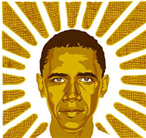Often when discussing politics with a friend or acquaintance it will come up that I am supporting a Third Party candidate. The obvious and inevitable response from the person I am talking to is "Your just wasting your vote." The next step is always a precarious one, I do not want to offend the other person, but I do want to educate. The problem here is that for most people they do not want to understand the argument for voting 3rd Party, they would like to sit blissfully unaware of their options. More often than not when I broach the 3rd Party question, the other persons eyes glaze over and they rebut every argument with "but it's throwing your vote away" or "but your candidate cannot win". The point is not whether or not my candidate can win...it is whether or not I should vote for a candidate on the sole basis that he/she is not as bad as the other candidate.
If I vote for John McCain in this election it will be on the sole basis that he is NOT Barack Obama. While I disagree with Obama on almost every single issue, I also disagree with John McCain on almost every single issue...just less so than Mr. Obama. Too many people see politics in the Red and Blue. I am a Democrat so I vote Democrat...or I am a Republican so I vote Republican. There are many shades of gray on the political spectrum. For example: both candidates support the bailout of AIG, Fannie Mae, Freddie Mac, and various other groups who are lining up to be bailed out. Obama wants a lot more regulation and bailout money...while John McCain wants slightly less bailout money and slightly less regulation. I disagree with both men...even though they argue that they disagree with each other.
That is basically how I feel on every issue, from abortion to taxes, so how could I possibly vote for John McCain?
Our founding fathers did not desire a two party system, in fact President Washington did not affiliate with either of the two major party's of his day. Over the last 230 years the Federalist, Anti-Federalist, Whig, and Democratic-Republican Party have all been major parties and have all died. Today's Democrats would identify with Jefferson and his allies but they look nothing like that party. Today's Republicans would identify with party of Lincoln but they are a shadow of what that party represented. The point is this; our country and the party's which represent them all change over time.
What has been the common factor in the end of one major Party and the start of another? The Third Party. In 1824 the followers of Andrew Jackson split from the Republican Party (not today's) to form the Democratic-Republican Party (a new one, the forerunner to today's Democrats) and in 1828 they successfully unseated both major party's and incumbent President John Quincy Adams. In 1854 the Republican Party was born (a new Rep. Party), created by disenchanted members of the Whig and Democrat Party. In 1860 Lincoln would win the Presidency as a Republican and the Whig Party would pass into history. In the late 1800's and early 1900's the progressive movement would win many votes away from the major party's. So many, in fact, that each Party would cannibalize some of the Progressive Reforms and make them their own. Some issues that were first championed by 3rd Party's and then picked up by one of the major party's: 40 hour workweek, child labor laws, women's suffrage, prohibition, direct election of Senators, and these are just scratching the surface. If Americans had not supported 3rd Party's at that time, we may have lost out on some of these reforms. In 1912 Republican Progressives refused to vote for William Taft, and instead supported Theodore Roosevelt and the Progressive Party (Bull Moose Party), the Progressives defeated the Republicans in the election but lost to the Democrat candidate Woodrow Wilson.
Fast forward to 1992, when Texas billionaire H. Ross Perot won 19% of the vote to place 3rd in the election. His campaign helped defeat the incumbent Republican George Bush, and win the election for Bill Clinton. Many view this as the ultimate throw away vote, in which the candidate who was the "lesser of two evils" lost because of a 3rd Party candidate. But what this actually highlights is the feeling of the electorate about the economy in 1992. Which is why we see the "Republican Revolution" of 1994, under the leadership of Newt Gingrich and his "contract with America". Without Ross Perot, there would have been no "Republican Revolution" because the Republican Party would not have seen the need for change in the way business was done.
I would argue that voting for someone that you did not feel comfortable with (for any reason) is wasting your vote. If you choose to cast your precious, single ballot for a man or woman that you do not believe is the right man or woman for the job, you are throwing your vote away. For these reasons and many others, I will be voting for Chuck Baldwin in 2008...and that is NOT throwing my vote away.
Monday, September 29, 2008
Subscribe to:
Post Comments (Atom)












2 comments:
I never thought about it like that, but it's so true. If both major parties see more and more people vote 3rd party, they would have to do something then to try and get back those votes, right?
Just found out, although too late, that Bob Barr was at UCF last week....that's pretty cool.
Indeed. That is the whole point, don't vote for the lesser of two evils...vote for the guy you think is right (based on the issues). If all Republicans who do not like McCain would do this...the Republican Party would change and FAST!
Bob Barr is a good candidate too...probably my 2nd choice behind Baldwin.
Post a Comment